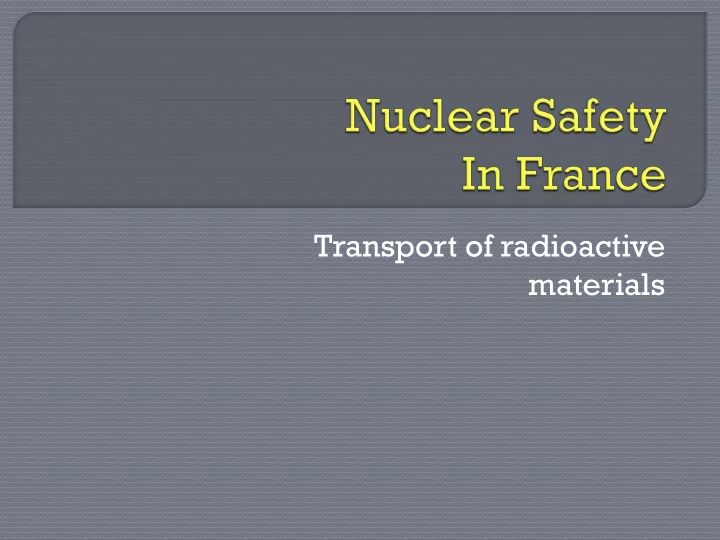

Transport of radioactive materials
Nuclear safety is the set of technical and organizational measures for the design, construction, operation, shutdown and dismantling of nuclear facilities, and the transport of radioactive substances, taken to prevent accidents and limit their effects
15 millions of packages called “dangerous” per year in France 900 000 radioactive packages
Inhalation or ingestion of radioactive particles in the case of release of radioactive substances into the environment External irradiation of people in the event of deterioration of the "biological protection package“ Contamination of the environment in case of release of radioactive substances Risk of criticality
Ability of some atoms to trigger a uncontrolled nuclear chain reaction just because of their proximity Favored in presence of water
Fire Mechanical impact due to a transport accident Introduction of water into the package Chemical interaction between the different parts of the package Heat release of the product
Necessity of control the quality of these packages
3 missions • Regulate: contribute to the development of regulations, providing advices to the Government on the draft decrees and ministerial orders or taking regulatory technical decisions • Control: verify compliance with the rules and regulations which are subject facilities or activities it audits • Inform: participate in public information, including cases of emergency
Since 2006 Right to information and obligation of information from the Administration and operators Access to reports of controls from the ASN
radiation at the surface of the vehicle : Less than 2 mSv/h Radiation at 2m: less than 0.1 mSv/h
Excepted packages Industrial packages and type A packages non fissile Type B and fissile packages Type C packages
Transport of very low radioactive quantites, like radiopharmaceuticals
Industrial: low concentration in terms of radioactivity Type A non fissile: radioactive substances with a low total activity
Regulation: tests to assess their robustness • exposure to a severe storm (rainfall of 5 cm per hour for at least one hour) • fall onto an unyielding surface of a variable height depending on the weight of the package (maximum 1.20 m) • compression equivalent to 5 times the mass of the package • penetration by dropping of a standard bar of a height of 1m on the package Results: no increase of the radiation more than 20%
most radioactive substances such as spent fuel, nuclear waste vitrified high- level and long-lived or the new fuel Around 60 000 packages per year in France
Height: 6.12m Diameter: 2.43m Container weight during filling: 114,3 t max Capacity: 20 or 28 cans with glass HLW
Designed so that safety is ensured even during transport accident • three events in series 9m drop onto an unyielding surface = shock of 50 km/h 1m drop on a punch encircling fire of at least 800 ° C for 30 minutes • Immersion in water to a depth of 15m, or 200m for spent fuel, for 8 hours Result: maximum 10 mSv/h at 1m
Tansport of highly radioactive materials by air No approval in France for Type C packages for civil use
For every new model of transport packages, the designer has to prove the compliance with safety standards Around 10 years to get it
periodic inspections of the components of the containment (screws, bolts, welds, seams…) periodic inspections of securing and handling members Checking of the storage conditions of packaging components
Half of the controls Checking of the marking, labeling, signaling and transport documents
Recommend
More recommend